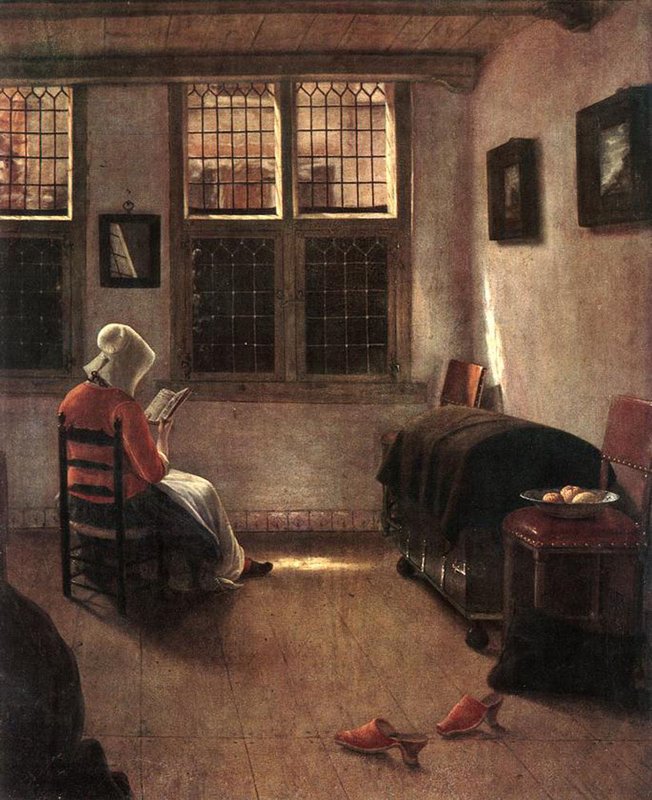In the quiet of the night, I cannot sleep. I cannot sleep because I haven’t heard my own voice in 52 minutes, and when I speak again, my voice will be thinner than it usually is, like when I stand in front of my class, with the introduction of Middlemarch stuck between my teeth.
So I keep quiet and let the sounds drift over me like a liquid soap without its stickiness.
I was reading a while ago. I sat at my desk and traced out the scratches on the surface. Where my pen usually rests in my hand, there are more scratches. They seem disrespectful and careless, while I try to remember when these scratches found home on my desk. The desk faces a wall, so as long as I look straight ahead, there is no indication of the existence of another world behind me.
I was reading Ferrante, and the whoosh whoosh whoosh of the fan kept me company. I didn’t plug in my earphones. I find that it is sometimes comforting to listen to nothing. Listening to nothing is an afterthought that doesn’t seem important in the everyday.
The quiet of my everyday is different from the quiet of America’s everyday. In America, when I went to bed, in my softest clothes, teeth brushed, face washed, I closed my eyes and listened to a continuous vacuum of sound. The sound of my own breathing became louder, and every three seconds, I took in a deep breath and let out air, trying to emulate the protagonist of a horror movie. I did this with little confidence though, because I was never sure of what was behind me. My horror movie could just be beginning.
As I read Ferrante, it is all these thoughts that sharply dig into the Italy that Ferrante is building in my head, word by word. I am distractedly thinking of America and home, and I imagine Ferrante sitting in the corner of my room, looking like no one, glaring at me through narrowed eyes because I am distracted and I should not be. I close my eyes before looking back at the kindle. Days of Abandonment is 51% complete. I have not read enough today.

Image Credits: Pieter Janssens Elinga – Reading Woman
In the book, Olga is now awake, lying sideways on her bed. For a few moments, she thinks she is floating because she has never shifted in her sleep, and this is the first time she has woken up differently. She is surprised to find that the headrest that is usually behind her head is gone now.
I am suddenly transported back to my room in Bangalore, when I slept on the rajai with bua. When I woke up in the morning, everyone else was awake, and through closed eyes, I heard soft whispers. Ma and bua were speaking to each other, “she doesn’t move at all in her sleep”, one of them was saying. I imagine Olga’s unhappy surprise at having woken up in a different place, but I imagine that she is also momentarily intrigued, because she has opened her eyes into a world different from the one she saw before sealing them shut the previous night.
I wonder if Olga is pretty, and if Mario is handsome. I cannot believe Olga’s descriptions as much as I want to. I find that I have cultivated a masochistic distrust in Ferrante and her characters, a byproduct of allowing her to take me to Naples with Lenu and Lila.
—
At night, when I am in bed, I make sure that the blanket is covering every part of my body. Protected by this, I stretch and look to my right, where my sister is already fast asleep. I imagine myself in Olga’s place. Olga’s husband has just left and her bed is empty for the first time in 15 years, so I tell myself that my sister is staying in her friend’s house for the night and the bed is empty.
I decide that if I wake up on her side of the bed, I will be upset. Ferrante is right.
—
In the morning, when I wake up, it is to a muffled twenty one pilots song that I heard on repeat two months ago. Now, N is playing it for herself while bathing. One light in the corner of the room is turned on and S is awake too.
Through the bathroom door, the singer is screaming, “sometimes quiet is violent”.
When I leave our room and walk into the dining room, papa is sitting at the table and NDTV boasts at its loudest. Ma is in the kitchen; she’s making dosas for everybody. I sit next to papa with kindle in hand and begin reading.
My mother then leaves the kitchen and says something to papa. Her voice is loud, and deeper than it usually is. She’s angry with somebody, but I am not listening closely enough to decide who it is. My father replies, and their voices become a swirl, mixed in with the mechanical, aggressive voice of the news anchor. I read the same line thrice before deciding to leave.
“No, sit down, where are you going?”
I shut the kindle and look around. S and N have joined us and conversation flows around me like water around a pillar. When we eat breakfast, we’re all quieter and Ma looks at me all of a sudden, “Why aren’t you saying anything?”
Drishti Rakhra
Latest posts by Drishti Rakhra (see all)
- From the 1940s, with generosity - 2nd December 2021
- Bangalore —> Dilli —> Bangalore <—> Dilli - 30th October 2017
- Amreeka-Jaipur-Home - 22nd February 2017





